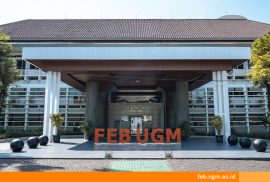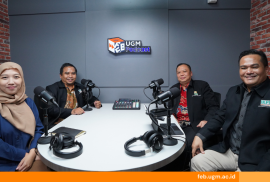On Friday (25/03) and (01/04), the Faculty of Economics and Business UGM held a Seminar of the Center for Public Sector and Taxation Studies (PSST) 2022 with the theme “Accounting Issues in Higher Education: Corporations, Autonomy, and Agency.” The seminar was held online through Zoom Meetings platform and live stream on Fakultas Ekonomika dan Bisnis YouTube channel. There were three speakers present at the seminar, Rosaline Tandiono, Ph.D., as a Lecturer at the Faculty of Economics and Communication at Binus University International, Prof. Dr. Didi Achjari, Ak., CA., as Lecturer of the Department of Accounting and Dean of the Faculty of Economics and Business UGM, and Budi Waluyo, Ph.D., as Lecturer and Deputy Director of Student Affairs at STAN (State Finance Polytechnic).
As the first speaker, Rosaline Tandiono explained the presentation material titled as “Commercialization and Corporations in Higher Education Field: A Qualitative Research in Accounting.” Broadly speaking, Rosaline discusses the understanding of commercialization and corporatization in higher education, how commercialization and corporatization began in higher education, what the situation is in Indonesia, and discusses her research on the topic. According to her, universities are not an independent organization, it is a landscape of today’s higher education, because universities are influenced by governments, policy makers, professional bodies, and various other stakeholders.
In addition, Rosaline also mentions the impact of neoliberalism on education, namely that previously education was considered a public good which meant that everyone had the right to get it. However, now education is considered more as a private good. At the end of the discussion of the material, Rosaline elaborated on her accounting research experience related to the topic of commercialization and corporatization in universities. “Why do we need to care about this topic? In general it is to raise awareness of the changing nature and purpose of higher education. As academics, there needs to be an effort to reflect upon their roles within the organization and ultimately urge them to decide and act,” she said.
Prof. Didi Achjari, as the second speaker, discussed the topic of discussion titled as “Managing Autonomous Universities: Financial and Political Challenges.” In general, Prof. Didi discussed the Legal Entity State University (PTN-BH) in terms of the form of funding, the funding mechanism from the APBN, and the accountability of PTN-BH. He also stated that according to him, PTN BH is not a privatization of higher education, based on Law No. 12 of 2012, because the state is still “present” in PTN-BH. In addition, Prof. Didi also mentioned several implications of establishing PTN-BH as taxable entrepreneurs, one of which is a philosophical flaw because universities are not entities/institutions that aim to seek profit/profit and logical fallacy because there can be a cash surplus, that is not the same as profit, which is then taxed.
Next was a discussion session by the third speaker, Budi Waluyo, Ph.D., who discussed the topic “Balancing Financial Autonomy and Control in Agencies: Issues Emerging from Indonesian Higher Education.” Based on his explanation, an agency can be defined as an organization/unit that is in charge of public tasks (policies, regulations, service delivery), but operates at arm’s length of the national or local government. There is no direct hierarchical relationship (anymore). Agencies may differ in legal form, type of financing and internal management conditions. In addition, he also describes fifteen lessons that can be learned from the topic, one of which is that the overall autonomy of the agency is actually a product of a balancing managerial, policy, financial and legal autonomy. However, there are no straightforward relationships between these different kinds of autonomy. The seminar then ended with a question and answer session between the participants and the speakers.
Reportage: Kirana Lalita Pristy.
Webinar video: https://youtu.be/JPlO5mPnINU




